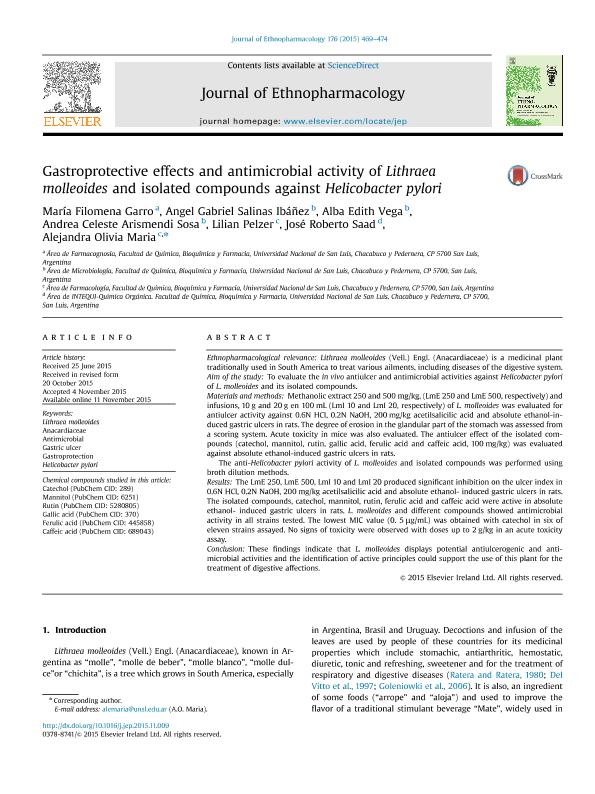Artículo
Gastroprotective effects and antimicrobial activity of Lithraea molleoides and isolated compounds against Helicobacter pylori
Garro, Maria Filomena ; Salinas Ibáñez, Angel Gabriel; Vega, Alba Edith; Arismendi Sosa, Andrea Celeste
; Salinas Ibáñez, Angel Gabriel; Vega, Alba Edith; Arismendi Sosa, Andrea Celeste ; Pelzer, Lilian; Saad, José Roberto; Maria, Alejandra Olivia
; Pelzer, Lilian; Saad, José Roberto; Maria, Alejandra Olivia
 ; Salinas Ibáñez, Angel Gabriel; Vega, Alba Edith; Arismendi Sosa, Andrea Celeste
; Salinas Ibáñez, Angel Gabriel; Vega, Alba Edith; Arismendi Sosa, Andrea Celeste ; Pelzer, Lilian; Saad, José Roberto; Maria, Alejandra Olivia
; Pelzer, Lilian; Saad, José Roberto; Maria, Alejandra Olivia
Fecha de publicación:
11/2015
Editorial:
Elsevier Ireland
Revista:
Journal Of Ethnopharmacology
ISSN:
0378-8741
Idioma:
Inglés
Tipo de recurso:
Artículo publicado
Clasificación temática:
Resumen
Ethnopharmacological relevance
Lithraea molleoides (Vell.) Engl. (Anacardiaceae) is a medicinal plant traditionally used in South America to treat various ailments, including diseases of the digestive system.
Aim of the study
To evaluate the in vivo antiulcer and antimicrobial activities against Helicobacter pylori of L. molleoides and its isolated compounds.
Materials and methods
Methanolic extract 250 and 500 mg/kg, (LmE 250 and LmE 500, respectively) and infusions, 10 g and 20 g en 100 mL (LmI 10 and LmI 20, respectively) of L. molleoides was evaluated for antiulcer activity against 0.6N HCl, 0.2N NaOH, 200 mg/kg acetilsalicilic acid and absolute ethanol-induced gastric ulcers in rats. The degree of erosion in the glandular part of the stomach was assessed from a scoring system. Acute toxicity in mice was also evaluated. The antiulcer effect of the isolated compounds (catechol, mannitol, rutin, gallic acid, ferulic acid and caffeic acid, 100 mg/kg) was evaluated against absolute ethanol-induced gastric ulcers in rats.
The anti-Helicobacter pylori activity of L. molleoides and isolated compounds was performed using broth dilution methods.
Results
The LmE 250, LmE 500, LmI 10 and LmI 20 produced significant inhibition on the ulcer index in 0.6N HCl, 0.2N NaOH, 200 mg/kg acetilsalicilic acid and absolute ethanol- induced gastric ulcers in rats. The isolated compounds, catechol, mannitol, rutin, ferulic acid and caffeic acid were active in absolute ethanol- induced gastric ulcers in rats. L. molleoides and different compounds showed antimicrobial activity in all strains tested. The lowest MIC value (0. 5 μg/mL) was obtained with catechol in six of eleven strains assayed. No signs of toxicity were observed with doses up to 2 g/kg in an acute toxicity assay.
Conclusion
These findings indicate that L. molleoides displays potential antiulcerogenic and antimicrobial activities and the identification of active principles could support the use of this plant for the treatment of digestive affections.
Archivos asociados
Licencia
Identificadores
Colecciones
Articulos(CCT - SAN LUIS)
Articulos de CTRO.CIENTIFICO TECNOL.CONICET - SAN LUIS
Articulos de CTRO.CIENTIFICO TECNOL.CONICET - SAN LUIS
Citación
Garro, Maria Filomena; Salinas Ibáñez, Angel Gabriel; Vega, Alba Edith; Arismendi Sosa, Andrea Celeste; Pelzer, Lilian; et al.; Gastroprotective effects and antimicrobial activity of Lithraea molleoides and isolated compounds against Helicobacter pylori; Elsevier Ireland; Journal Of Ethnopharmacology; 176; 11-2015; 158-169
Compartir
Altmétricas



